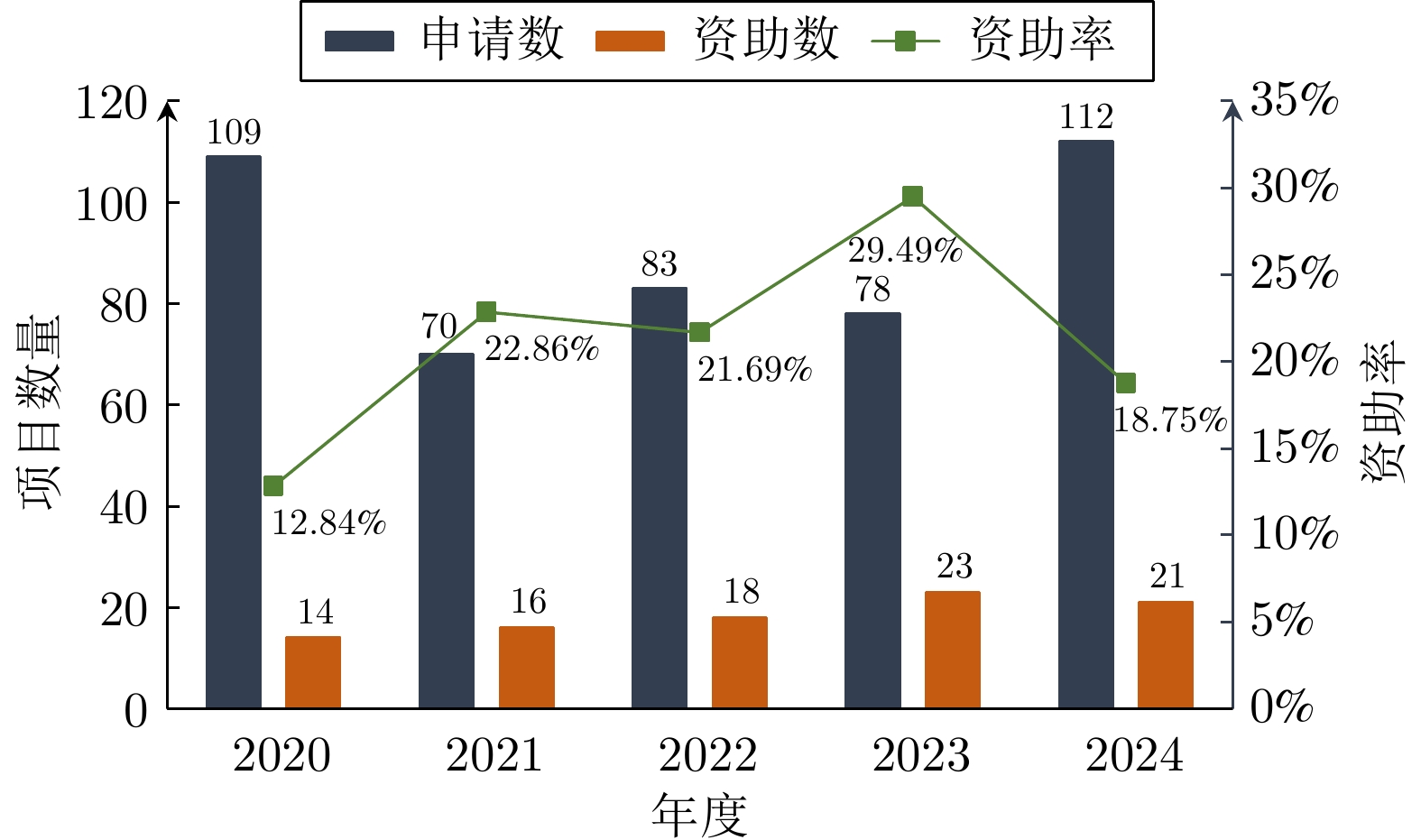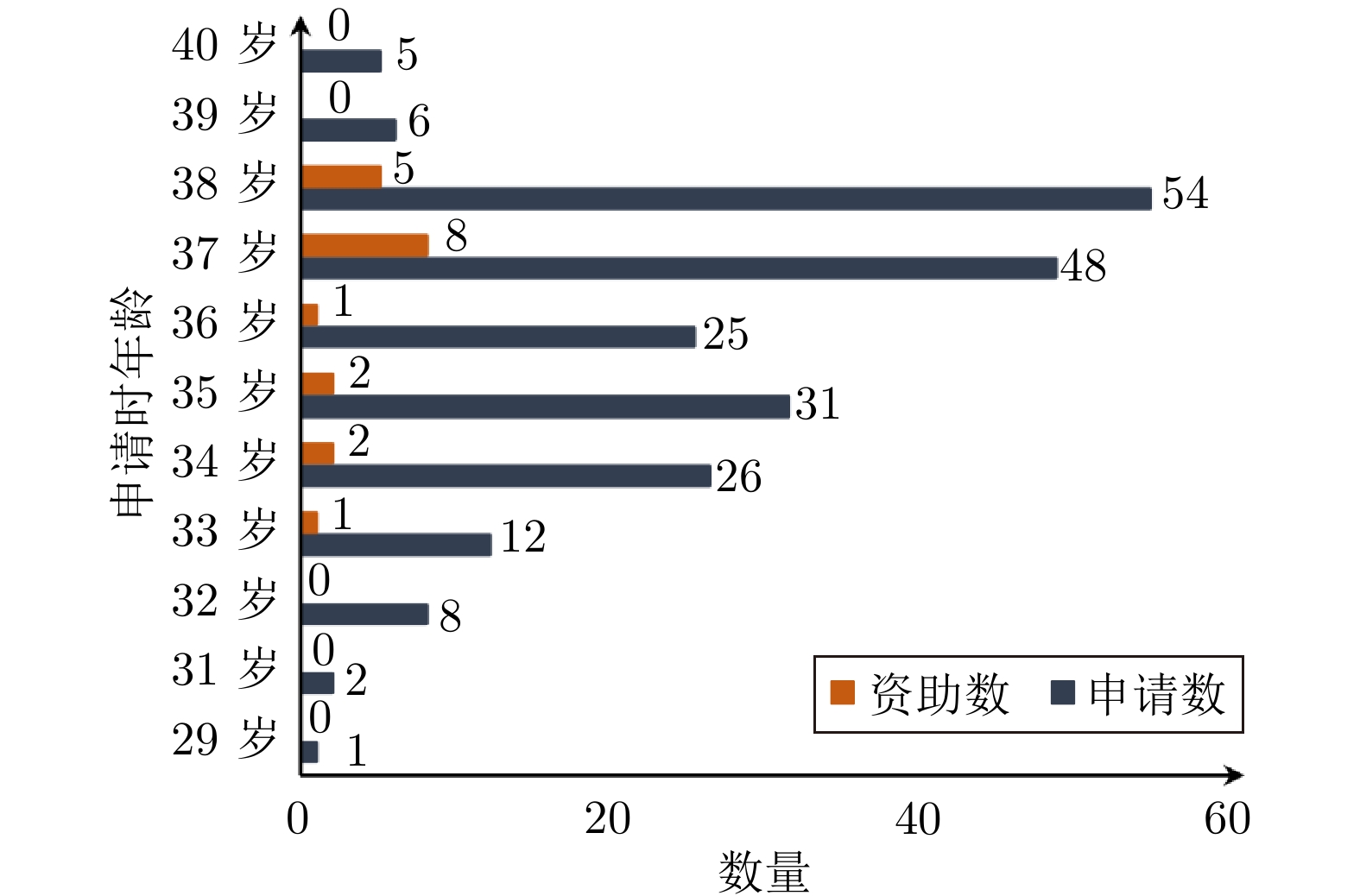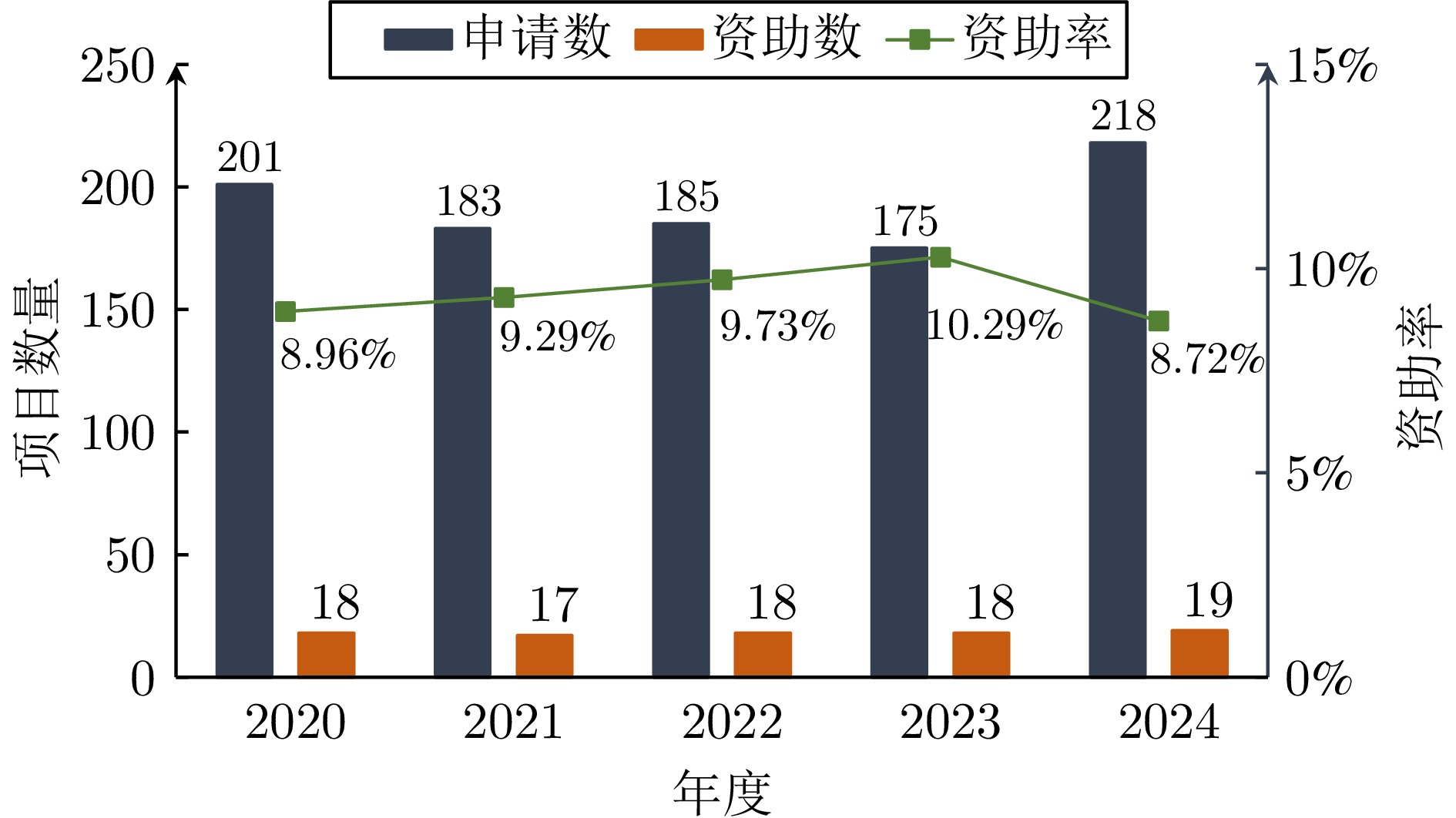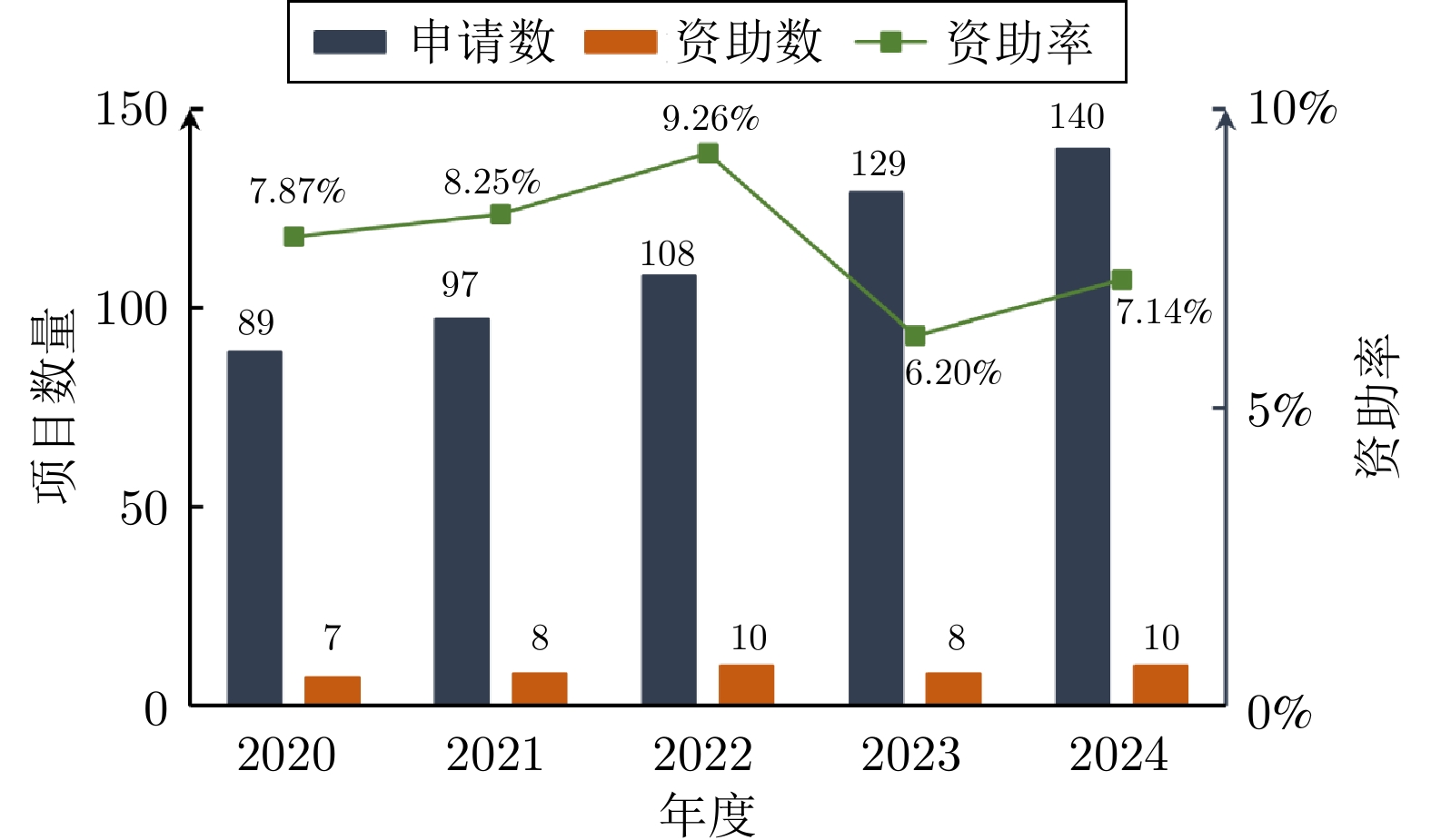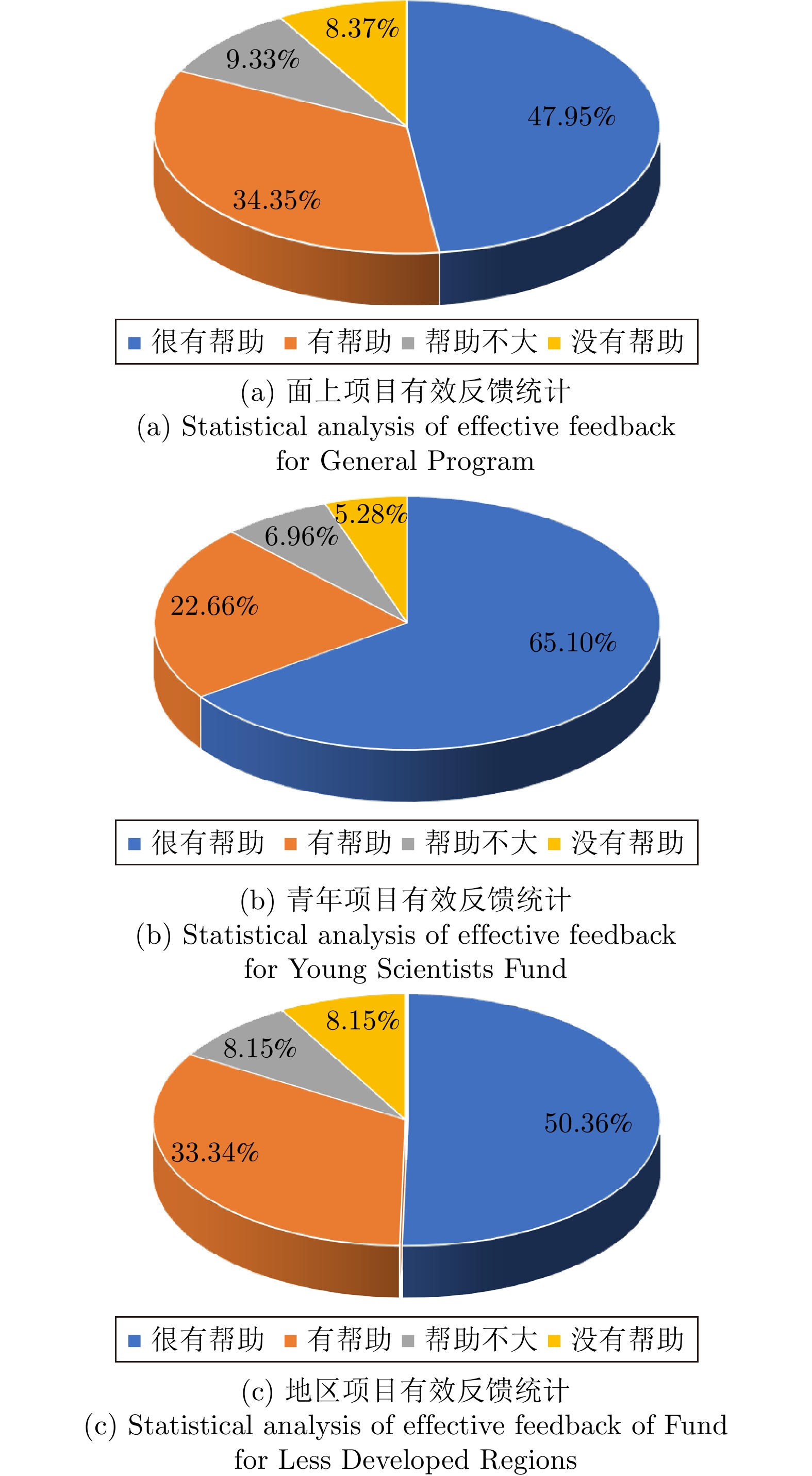Overview of National Natural Science Foundation of China Proposal Application and Funding Status of Automation Discipline in 2024
-
摘要: 为使自动化学科的科研人员了解该领域基础研究队伍、主要研究方向和发展趋势, 本文统计并分析了2024年度自动化学科面上项目、青年科学基金项目、地区科学基金项目、重点项目、优秀青年科学基金项目和国家杰出青年科学基金项目的申请与资助情况. 此外, 本文还重点介绍了自动化学科RCC (Responsibility, Credibility, Contribution)评审机制试点工作和项目倾斜支持政策. 最后进行了总结和展望.Abstract: In order to enable researchers in automation discipline to understand the basic research teams, main research directions and development trends in this field, this article provides a statistical analysis of various types of projects, including General Program, Young Scientists Fund, Fund for Less Developed Regions, Key Program, Excellent Young Scientists Fund, and National Science Fund for Distinguished Young Scholars in 2024. In addition, this article also focuses on the RCC (Responsibility, Credibility, Contribution) pilot evaluation mechanism and program preferential support policies for automation discipline. Finally, a summary and outlook are given.
-
表 1 F03二级申请代码及代码名称
Table 1 Secondary application code and code name of F03
二级申请代码 代码名称 F0301 控制理论与技术 F0302 控制系统与应用 F0303 系统建模理论与仿真技术 F0304 系统工程理论与技术 F0305 生物、医学信息系统与技术 F0306 自动化检测技术与装置 F0307 导航、制导与控制 F0308 智能制造自动化系统
理论与技术F0309 机器人学与智能系统 F0310 人工智能驱动的自动化 F0311 新兴领域的自动化理论与技术 表 2 2024年度F03“面青地”项目申请与资助情况
Table 2 Application and funding status of “General-Young-Regions” projects in F03 for the year 2024
项目类型 申请数(项) 资助数(项) 申请依托单位数(个) 获资助依托单位数(个) 面上项目 3313 391 506 145 青年项目 2492 502 565 188 地区项目 254 33 85 20 表 3 近五年(2020—2024年) F03“面青地”项目依托单位申请与资助情况
Table 3 Application and funding status of host institutions of “General-Young-Regions” projects in F03 over the past five years (2020—2024)
年度 面上项目 青年项目 地区项目 申请单位数(个) 资助单位数(个) 资助占比 申请单位数(个) 资助单位数(个) 资助占比 申请单位数(个) 资助单位数(个) 资助占比 2024 506 145 28.66% 565 188 33.27% 85 20 23.53% 2023 432 137 31.71% 528 191 36.17% 74 23 31.08% 2022 437 137 31.35% 483 181 37.47% 69 20 28.99% 2021 428 139 32.48% 478 178 37.24% 70 22 31.43% 2020 419 125 29.83% 461 174 37.74% 73 24 32.88% 表 4 2024年度F03面上项目和青年项目申请数排名前五的依托单位
Table 4 Top five host institutions with highest applications for General Program and Young Scientists Fund in F03 for the year 2024
序号 面上项目 序号 青年项目 单位名称 申请数(项) 申请占比 单位名称 申请数(项) 申请占比 1 北京航空航天大学 78 2.35% 1 中国人民解放军国防科技大学 46 1.85% 2 东北大学 68 2.05% 2 北京航空航天大学 36 1.44% 3 北京理工大学 65 1.96% 3 上海交通大学 33 1.32% 4 哈尔滨工业大学 60 1.81% 4 清华大学 26 1.04% 5 西北工业大学 59 1.78% 5 哈尔滨工业大学 25 1.00% 表 5 2024年度F03面上项目和青年项目资助数排名前五的依托单位
Table 5 Top five host institutions with highest funding for General Program and Young Scientists Fund in F03 for the year 2024
序号 面上项目 序号 青年项目 单位名称 资助数(项) 资助率 单位名称 资助数(项) 资助率 1 北京航空航天大学 15 19.23% 1 北京航空航天大学 17 47.22% 2 同济大学 12 30.76% 2 北京理工大学 13 56.52% 3 哈尔滨工业大学 12 20.00% 3 浙江大学 12 66.67% 4 北京理工大学 12 18.46% 4 哈尔滨工业大学 12 48.00% 5 上海交通大学 11 22.00% 5 中国人民解放军
国防科技大学12 26.09% 5 东北大学 11 16.18% 表 6 2024年度F03各申请代码下“面青地”项目申请与资助情况
Table 6 Application and funding status of “General-Young-Regions” projects in F03 with all application codes for the year 2024
申请代码 面上项目 青年项目 地区项目 申请数(项) 资助数(项) 资助率 申请数(项) 资助数(项) 资助率 申请数(项) 资助数(项) 资助率 F0301 482 59 12.24% 410 88 21.46% 48 8 16.67% F0302 345 40 11.59% 278 57 20.50% 31 4 12.90% F0303 256 29 11.33% 193 34 17.62% 28 3 10.71% F0304 202 24 11.88% 183 36 19.67% 17 1 5.88% F0305 234 29 12.39% 135 28 20.74% 20 1 5.00% F0306 299 34 11.37% 203 42 20.69% 31 5 16.13% F0307 248 28 11.29% 219 44 20.09% 9 2 22.22% F0308 145 18 12.41% 116 21 18.10% 11 1 9.09% F0309 599 68 11.35% 463 94 20.30% 33 5 15.15% F0310 358 44 12.29% 229 43 18.78% 19 2 10.53% F0311 136 18 13.24% 57 15 26.32% 6 1 16.67% F03▲ 9 0 0.00% 6 0 0.00% 1 0 0.00% 合计 3313 391 11.80% 2492 502 20.14% 254 33 12.99% ▲注: F03表示项目申请人只选择了一级申请代码作为其主要申请代码. 表 7 2024年度F03“面青地”项目排名前十关键词的词频和资助率
Table 7 Top ten frequencies and funding rates of keywords for “General-Young-Regions” projects in F03 for the year 2024
序号 关键词 申请项目词频(次) 资助项目词频(次) 关键词
资助率▲1 深度学习 237 30 12.66% 2 故障诊断 210 53 25.24% 3 多智能体系统 179 38 21.23% 4 强化学习 164 39 23.78% 5 协同控制 158 62 39.24% 6 稳定性 136 45 33.09% 7 非线性系统 108 36 33.33% 8 自适应控制 90 27 30.00% 9 数据驱动建模 88 9 10.23% 10 分布式协同控制 87 12 13.79% ▲注: 关键词资助率=(关键词在资助项目中的频次/关键词在申请项目中的频次)×100%. 表 8 2024年度F03重点项目指南、申请与资助情况
Table 8 Guideline, application and funding status of Key Program in F03 for the year 2024
二级
申请代码指南数(个) 申请数(项) 申请指南比 资助数(项) F0301 4 12 3.00:1 2 F0302 5 13 2.60:1 5 F0303 2 2 1.00:1 1 F0304 2 16 8.00:1 1 F0305 5▲ 16 3.20:1 4 F0306 5▲ 27 5.40:1 3 F0307 1 4 4.00:1 1 F0308 0 0 — 0 F0309 4 17 4.25:1 4 F0310 1 5 5.00:1 0 F0311 0 0 — 0 合计 26★ 112 4.31:1 21 ▲注: 重点项目群(解析与重构跨尺度基因调控的理论与方法、自动化传感器设计及智能感知技术), 分别支持4个重点研究方向.
★注: 65号指南包括F0301与F0303两个二级申请代码, 66号指南包括F0301与F0304两个二级申请代码, 67号指南包括F0301与F0310两个二级申请代码, 立项总数为26项.表 9 2024年度F03优青项目申请与资助情况
Table 9 Application and funding status of Excellent Young Scientists Fund in F03 for the year 2024
二级申请代码 申请数(项) 资助数(项) 资助率 F0301 29 4 13.79% F0302 24 2 8.33% F0303 12 0 0.00% F0304 16 1 6.25% F0305 14 1 7.14% F0306 14 1 7.14% F0307 15 2 13.33% F0308 7 0 0.00% F0309 50 5 10.00% F0310 31 3 9.68% F0311 6 0 0.00% 合计 218 19 8.72% -
[1] 国家自然科学基金委员会. 2024年度国家自然科学基金项目指南. 北京: 科学出版社, 2024.National Natural Science Foundation of China. Guide to Programs (Year 2024). Beijing: Science Press, 2024. [2] 李超, 王成红, 宋苏, 鲁仁全. 自动化领域科学基金十年情况分析. 自动化学报, 2013, 39(4): 461−468Li Chao, Wang Cheng-Hong, Song Su, Lu Ren-Quan. Analysis on situation of national natural science foundation of China in automation domain during last decade. Acta Automatica Sinica, 2013, 39(4): 461−468 [3] 邓方, 宋苏, 刘克, 吴国政, 付俊. 国家自然科学基金自动化领域数据分析与研究热点变化. 自动化学报, 2018, 44(2): 377−384Deng Fang, Song Su, Liu Ke, Wu Guo-Zheng, Fu Jun. Data and research hotspot analyses of national natural science foundation of China in automation field. Acta Automatica Sinica, 2018, 44(2): 377−384 [4] 吴国政. 从F03 项目资助情况分析我国自动化学科的发展现状与趋势. 自动化学报, 2019, 45(9): 1611−1619Wu Guo-Zheng. Analysis of the status and trend of the development of China's automation discipline from F03 funding of NSFC. Acta Automatica Sinica, 2019, 45(9): 1611−1619 [5] 孙长银, 吴国政, 王志衡, 丛杨, 穆朝絮, 贺威. 自动化学科面临的挑战. 自动化学报, 2021, 47(2): 464−474Sun Chang-Yin, Wu Guo-Zheng, Wang Zhi-Heng, Cong Yang, Mu Chao-Xu, He Wei. On challenges in automation science and technology. Acta Automatica Sinica, 2021, 47(2): 464−474 [6] 刘行健, 刘屿, 赵瑞珍. 2023 年度自动化领域 (F03) 国家自然科学基金项目申请与资助情况综述. 自动化学报, 2023, 49(12): 2457−2466Liu Xing-Jian, Liu Yu, Zhao Rui-Zhen. NSFC proposal application and funding status of automation field (F03) in 2023: An overview. Acta Automatica Sinica, 2023, 49(12): 2457−2466 [7] 国家自然科学基金委员会. 2023年度国家自然科学基金项目指南. 北京: 科学出版社, 2023.National Natural Science Foundation of China. Guide to Programs (Year 2023). Beijing: Science Press, 2023. [8] 国家自然科学基金委员会. 国家自然科学基金“十四五”发展规划 [Online], available: www.nsfc.gov.cn/publish/portal0/tab1392, 2023National Natural Science Foundation of China. The 14th Five-Year plan of the national natural science foundation of China [Online], available: www.nsfc.gov.cn/publish/portal0/tab1392, 2023 [9] 张韶阳, 雷蓉, 高阵雨, 陈钟, 王长锐. 持续升级科学基金人才资助体系为基础研究高质量发展提供有力支撑. 中国科学基金, 2022, 36(5): 765−771Zhang Shao-Yang, Lei Rong, Gao Zhen-Yu, Chen Zhong, Wang Chang-Rui. Continuously upgrade the talent funding system to provide strong support for the high-quality development of fundamental research. Bulletin of National Natural Science Foundation of China, 2022, 36(5): 765−771 [10] 张丽佳, 安凤平, 宋朝晖, 何杰, 刘克. 信息科学部优化学科布局改革试点工作实践与分析. 中国科学基金, 2022, 36 (5): 708−714Zhang Li-Jia, An Feng-Ping, Song Zhao-Hui, He Jie, Liu Ke. Practice and analysis of the pilot work of optimizing the layout of information science disciplines. Bulletin of National Natural Science Foundation of China, 2022, 36 (5): 708−714 -




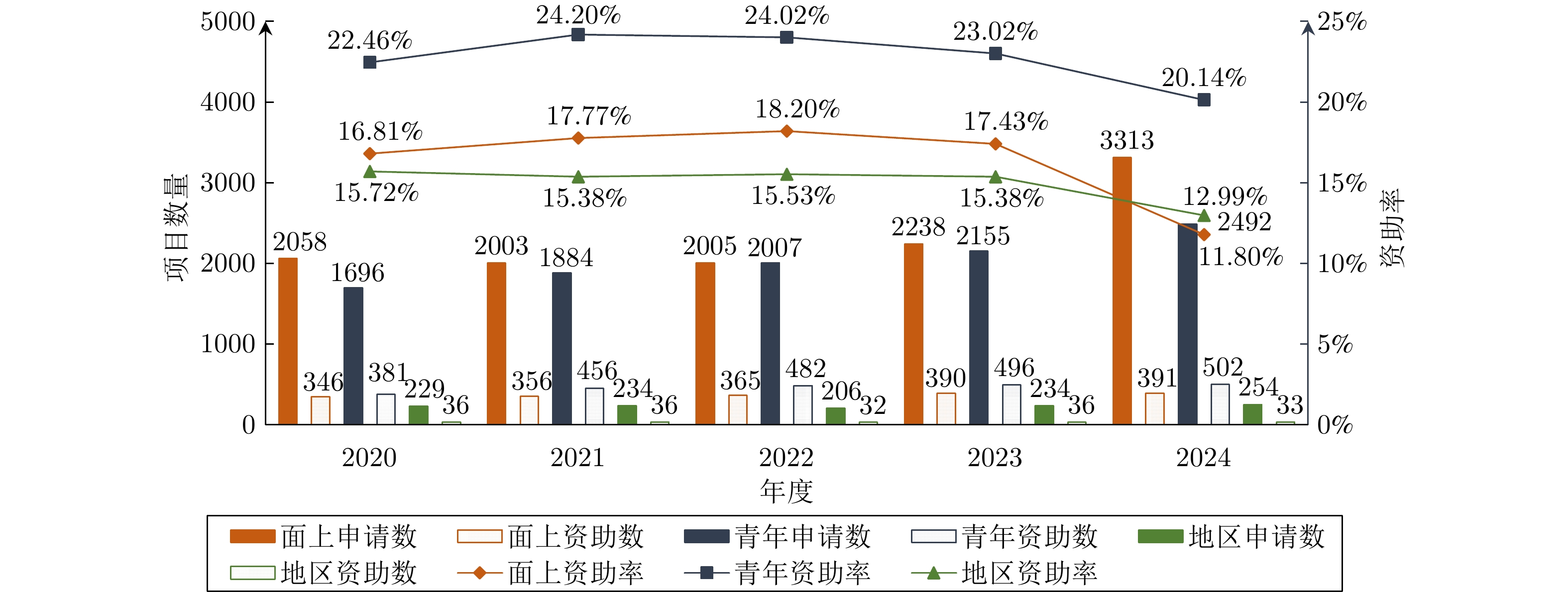
 下载:
下载:

